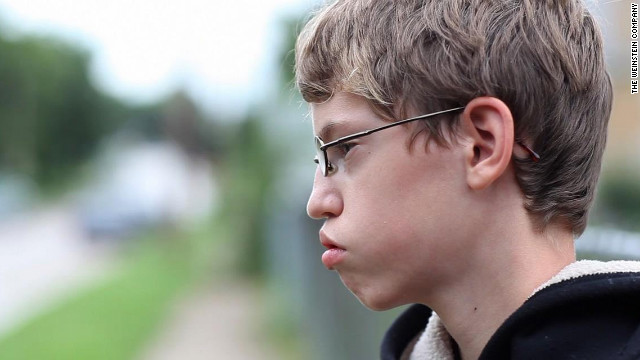
- "Bully" received an R rating because the F-word is used in it a handful of times
- Director Lee Hirsch takes a sympathetic, insightful look at five anguished kids
- It's a portrait of good kids reduced to shells of themselves by a climate of hate and fear
(EW.com) -- Harvey Weinstein never met a ratings controversy that he couldn't massage into a publicity campaign.
He did it in the '90s, when he turned up the heat on the teensploitation psychodrama "Kids," all because the film received a rating of NC-17 (which it probably deserved). He did it two years ago, when the downbeat-sexy "Blue Valentine" got slapped with the same scarlet letter (which it didn't deserve at all).
But in the case of "Bully," Weinstein isn't just mounting a PR blitz -- he's fighting the good fight. The movie is a sensitive and eye-opening documentary about the epidemic of bullying in American public schools. It's a film that would do well to be seen by as many teenagers as possible, and Weinstein had wanted to show it in schools. Yet "Bully" received an R rating, all because the F-word is used in it a handful of times. The Weinstein Co. has now decided to release "Bully" unrated. This doesn't solve the problem, since some theaters refuse to show unrated movies. So the very audience that Bully was made for still might have a hard time getting near it.
Weinstein hired David Boies and Ted Olson, the attorneys who helped overturn California's Proposition 8, to take on the Motion Picture Association of America. The MPAA, with its famously fusty, punitive, and -- some would say -- arbitrary ratings system, defended the R rating for "Bully," stating that it wouldn't be fair to make an exception just because of the movie's good intentions.
I agree that they shouldn't just make an exception: They should do a heck of a lot more. That the MPAA is content to keep a film as humane and as deeply unsensational as "Bully" away from most of the adolescents whose lives it could possibly help is a folly and outrage.
"Bully," directed by Lee Hirsch, takes a sympathetic, insightful look at five anguished kids from suburban and rural communities around the country and how the bullying that they've endured has shaped their lives. Tyler, 17 years old, was so mocked by his peers that he hanged himself. Alex, 12, born prematurely (at just 26 weeks), is a sweet, smart kid singled out because of his "fish face."
He has been slammed into lockers, sat on during bus rides, called "b****" and "f*****" -- and after all that, it was only really clear how bad the problem was when he stopped complaining. (Being bullied had become his only reality.) Kelby, a 16-year-old lesbian, suffered abuse to the point that she tried to commit suicide three times.
Why are these kids targeted? Some of it is based on looks and prejudice, but much of it represents nothing more -- or less -- than the ostracization of those who are lonely or shy. They're viewed as "outsiders," and then vilified for it. "Bully" is a portrait of good kids reduced to shells of themselves by a climate of toxic hate and fear.
There's only one thing missing from the movie, and that's an in-depth look at the bullies themselves. We're forced to guess at what has made them into junior sadists. My own conjecture is that their almost complete lack of empathy represents the channeling of a larger current of intolerance now at loose in the culture -- the kind you see increasingly in politics, not to mention all over the Internet.
Arguments against the ratings system have, of course, been made many times before: by directors, producers, and film critics -- and, in 2006, by Kirby Dick in his documentary "This Film Is Not Yet Rated," which opened the door on the MPAA's antiquated maze of codes and restrictions. As Dick powerfully argued, what's fundamentally broken about the MPAA isn't the system so much as the thinking behind the judgments. The ratings-board members, swathed in their shadow of anonymity, insist on a nearly Victorian double standard for sex and violence: Anything associated with the former (like the word "f---") is treated as taboo, whereas horror and action films that feature over-the-top violence routinely get a PG-13.
This outdated distinction may be a reflection of "American values," but that does not make it right. And the fact that the board tends to go easier on big-budget blockbusters may be the shoddiest double standard of all. It's an indication that too many questionable agendas are guiding these judgments.
A film like "Bully" makes it clear that there's something deeply wrong with this picture. For this is an urgent and moral movie; there shouldn't be a puritanical roadblock standing between it and its audience. As long as the MPAA is issuing its cavalier decrees, though, they're the ones acting like bullies.
"Bully": B+
See the full article at EW.com.
No comments:
Post a Comment